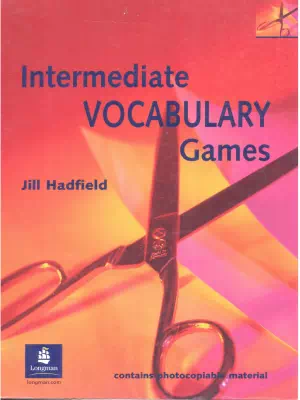Intermediate Vocabulary Games
Intermediate Vocabulary Games PDF download

A game is an activity with rules, a goal and an element of fun. There are two kinds of games: competitive games, in which players or teams race to be the first to reach the goal, and cooperative games, in which players or teams work together towards a common goal.
The activities in this book fall into two further categories: linguistic games and communicative games. In linguistic games, the goal of the game is linguistic accuracy: in the case of these vocabulary games, remembering the correct word. Communicative games have a goal or aim that is not linguistic: successful completion of the game involves carrying out a task such as exchanging information, filling in a picture or chart, or finding two matching cards, rather than the correct production of language. However, in order to carry out this task it will be necessary to use language and, by careful construction of the task, it is possible to specify in advance what language will be required.
These games can be used at all stages of the progression from controlled to free practice, serving at one end of the range as a memory aid and repetition drill, and at the other as a chance to use language freely and as a means to an end rather than an end in itself. They can also serve as a diagnostic tool for the teacher, who can note areas of difficulty and take appropriate remedial action.
Remembering new words is hard. Words are slippery things: before you know it, they’re wiggled away and are gone. It takes a lot of effort to keep them where you want them. It seems to me that in order to retain a word, students have to go through three distinct processes. They have to fix the meaning of the word in their minds; they have somehow to make the word their own — to personalise it so that it takes on a colour and a character for them and becomes part of their individual word store — and they have to use the word creatively in context for themselves.
This is the second in a series of resource books of practice activities for vocabulary: the games have been designed to practise, not to introduce, new vocabulary. The book assumes that introduction and explanation of the vocabulary has been done in the textbook or other course material that the teacher and class is following.
This book differs slightly from Elementary Vocabulary Games, in that it is aimed at addressing the particular needs of intermediate learners. The lexical areas covered begin to depart from the elementary field of concrete nouns and everyday vocabulary to include more abstractions and vocabulary centred around more complex topics. Intermediate learners need more abstract or descriptive vocabulary to talk about such things as feelings and sensations or to describe objects or scenery. They also begin to want to use their language to discuss issues of interest. About one third of the units cover concrete, everyday, or situational vocabulary (e.g. Transport, Illness) and are of a level similar to the units towards the end of the elementary book, one third cover more abstract and descriptive vocabulary (e.g. Sensations, Emotions), and one third cover issues and complex topics (e.g. Crime, Education).
The materials are graded within the book, those towards the end using more complex language and containing game and role cards with short reading texts to reflect the intermediate student’s need for more reading material.
The vocabulary items have been arranged in lexical sets following topics used in most textbooks and courses at this level. The topic area, vocabulary focus, structures and any extra vocabulary (not the main focus) that the students will need are all listed at the start of the teacher’s notes. Structures are those that a student at this stage could reasonably be expected to know.
As in Elementary Vocabulary Games, each unit has three games, taking the student through the three processes described above: (1) memorising, (2) personalising and (3) communicating. The three stages are self-contained, so that the teacher is free to select or discard any game, according to what she feels her students need; they are all different in nature and make use of different game techniques.
Format:PDF
Size: 24,16 MB
Pages:146 p.
Series:Vocabulary Games
Level:Intermediate
Date: 1999
DOWNLOAD
Intermediate Vocabulary Games PDF
Related Content
Elementary Vocabulary Games
Games for vocabulary Practice